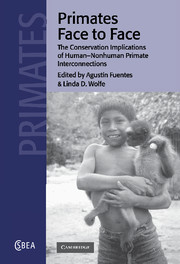Book contents
- Frontmatter
- Contents
- List of contributors
- Foreword
- Acknowledgements
- Introduction
- Part 1 Science and nonhuman primates
- Part 2 Cultural views of nonhuman primates
- 4 Monkey as food, monkey as child: Guajá symbolic cannibalism
- 5 Ethnoecology of monkeys among the Barí of Venezuela: perception, use and conservation
- 6 Primates in Matsigenka subsistence and world view
- 7 Monkey King in China: basis for a conservation policy?
- 8 Reflections on the concept of nature and gorillas in Rwanda: implications for conservation
- Part 3 Conservation of nonhuman primates
- Part 4 Government actions, local economies and nonhuman primates
- Index
5 - Ethnoecology of monkeys among the Barí of Venezuela: perception, use and conservation
Published online by Cambridge University Press: 20 October 2009
- Frontmatter
- Contents
- List of contributors
- Foreword
- Acknowledgements
- Introduction
- Part 1 Science and nonhuman primates
- Part 2 Cultural views of nonhuman primates
- 4 Monkey as food, monkey as child: Guajá symbolic cannibalism
- 5 Ethnoecology of monkeys among the Barí of Venezuela: perception, use and conservation
- 6 Primates in Matsigenka subsistence and world view
- 7 Monkey King in China: basis for a conservation policy?
- 8 Reflections on the concept of nature and gorillas in Rwanda: implications for conservation
- Part 3 Conservation of nonhuman primates
- Part 4 Government actions, local economies and nonhuman primates
- Index
Summary
Introduction
In this chapter, I describe the Barí, an indigenous people of Venezuela, their environment, and their perception, knowledge and use of monkeys. Most of the information provided in this chapter comes from extensive fieldwork and personal communications from my father, Roberto Lizarralde, and Dr. Stephen Beckerman, both of whom have participated in extensive anthropological fieldwork and have written extensively about the Barí ecology. In addition to several childhood visits with my father (starting in 1965), I have spent almost 30 months doing fieldwork with the Barí since 1988.
Until the present, the Barí have eaten monkeys, kept them as pets, and used their teeth for decoration. According to Beckerman (1980, p. 94) the monkeys in the area inhabited by the Barí accounted for 22% of the total mass of mammals and birds hunted with bow and arrows in the early 1970s. Over the past 30 years, changes in the environment and human–monkey relationships, and an increase in the Barí's population density, have been coupled with a drastic reduction in the size of the territory of the Barí. Owing to these changes, the Barí have been experiencing a depletion of major fauna, including all populations of monkeys.
The Barí are facing an unsure future as an ethnic group.
- Type
- Chapter
- Information
- Primates Face to FaceThe Conservation Implications of Human-nonhuman Primate Interconnections, pp. 85 - 100Publisher: Cambridge University PressPrint publication year: 2002
- 29
- Cited by



